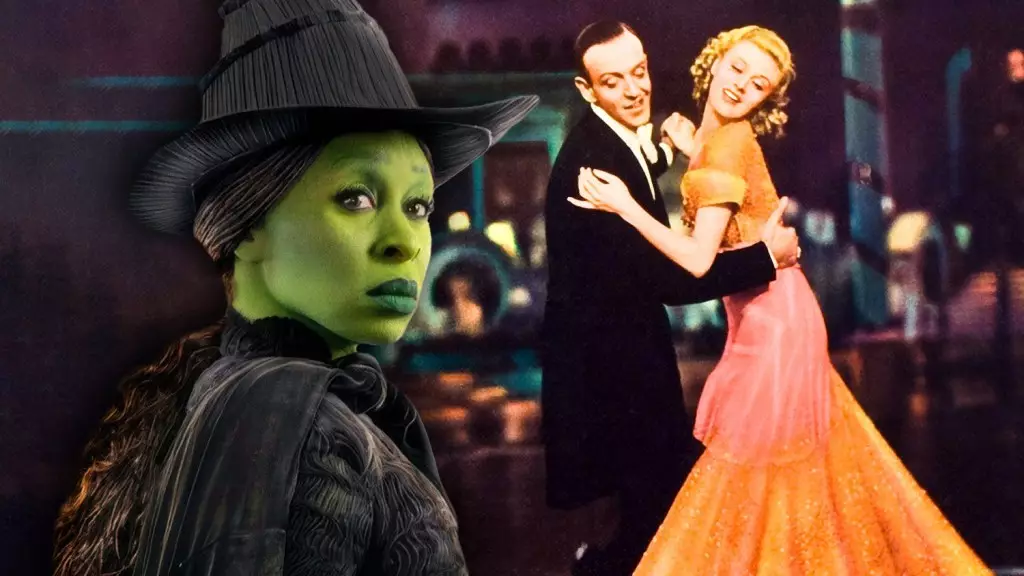The pandemic underscored our longing for joy, prompting many to seek solace in the nostalgic grandeur of classic MGM musicals. Films like “Singing in the Rain” and “Top Hat” not only introduced audiences to catchy melodies and elegant dances but also to an era characterized by light-hearted escapism. However, as we pivot into a new cycle of musicals, it’s essential to recognize how the genre has evolved, distilling a more intricate palette of emotions that reflects contemporary society’s complexities.
While nostalgic musicals represented sheer joy and levity, today’s offerings exhibit a tone shaded with realism, grappling with themes that often dwell in the realm of the nuanced and the painful. The excitement surrounding award nominations for new talents like Timothée Chalamet, Selena Gomez, and Ariana Grande signals that the musical genre has indeed reasserted its place in modern cinema. Yet, these newer musicals seldom revel in unrestricted joy. The juxtap between the light, often whimsical tales of yesteryear and the somber narratives today suggests that the musical landscape is no longer just about cheerful escapism but a reflection of deeper societal issues.
For instance, in the contemporary hit “Wicked,” viewers do not merely watch a tale of friendship and ambition unfold; they are invited to consider the complexities of good and evil through a modern lens. The characters are multi-dimensional, grappling with moral ambiguities that mirror real-life dilemmas. While “Singing in the Rain” showcased carefree characters dancing through life, today’s protagonists struggle against a backdrop of inner turmoil, societal pressures, and self-discovery.
The characters of classic musicals were often archetypes: the charming lead, the misunderstood heroine, and the comedic sidekick—all thriving in well-defined roles that seldom strayed beyond their surface traits. However, current narratives demand a richer character palette. Take Chalamet’s portrayal of Bob Dylan in the upcoming “Wonka.” Rather than resonating with simple charm, his character embodies a profound sense of identity crisis, navigating public perception and artistic integrity in an era of change. This evolution extends beyond individuals, as ensemble casts tackle collective issues facing their generation.
In “Emilia Pérez,” we witness Selena Gomez and Karla Sofía Gascón confronting not only personal struggles but societal structures, manifesting narratives far removed from the lighthearted misadventures of the past. Their characters address complex themes like gender identity and familial loyalty in the face of danger, thereby showcasing a divergence from traditional storytelling to narratives that demand introspection and empathy.
Moreover, this new cycle of musicals actively engages with themes of transformation and personal agency. The poignant story arcs challenge audiences to find relevance in their struggles. For instance, in exploring Maria Callas’ decline in “Maria,” Angelina Jolie invites viewers into the inner landscape of a once-revered icon grappling with loss, a narrative far removed from simplistic portrayals. The music that underscores these stories is equally impactful, enhancing emotional resonance rather than serving solely as catchiness.
Interestingly, musical adaptations of films such as “Nightbitch” or “Babygirl” illustrate how lyrical storytelling can provide insights into the psyche of modern protagonists, demanding a richer engagement with both music and narrative. This lens of innovation enhances audience connection, creating compelling experiences that activate both emotional and intellectual responses.
The evolution of musicals in the post-pandemic era represents not only a resurfacing of an art form but a profound transformation of its essence. As audiences, we are no longer passive recipients of frothy entertainment; we engage with nuanced narratives that resonate with our realities and aspirations. The future of musicals lies in embracing complexity and multidimensionality, balancing artistry with authenticity. As we cheer on the stars of this new generation, we bear witness to a musical landscape that is more reflective of the world we navigate today—one that celebrates not just joy, but the multifaceted human experience.

